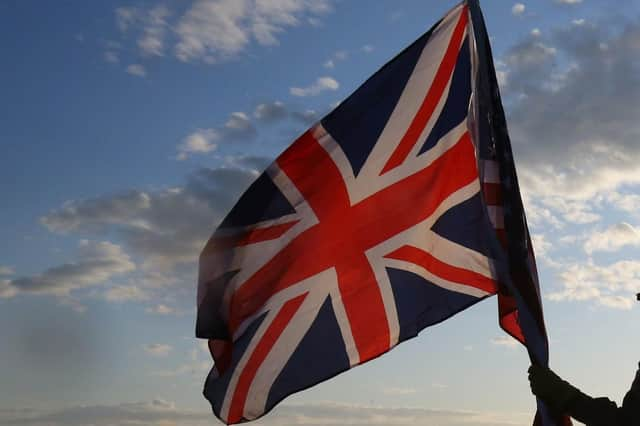Owen Polley: Unionists should tell a positive story about the UK but also be wary of threats to Northern Ireland's place in it


It is important to highlight its lack of effectiveness so that we understand how Northern Ireland’s relationship with the rest of the UK has changed. But, despite the DUP’s claims to have made progress, the row over Stormont’s return was essentially a disagreement among unionists about what to do next, now that its campaign against the sea border appears to have failed
The Ulster Unionist Party, and others like them, claim that they reached the DUP’s position two years ago.
Advertisement
Hide AdAdvertisement
Hide AdThey recognised that the NI protocol detached Northern Ireland from the mainstream British economy. But Doug Beattie, Sir Reg Empey and others argued that that decision was not going to be reversed in the foreseeable future.
Their strategy was to move on, at least for the time being, by concentrating on protecting other aspects of the Union and operating devolution in a way that encourages voters to be satisfied with the status quo.
That plan is sometimes explained in a careless way, that sounds as if it’s making light of important pillars of our constitution (like the Acts of Union), but it should not be dismissed casually.
The counterpoint, articulated by the TUV’s Jim Allister among others, is that, thanks to the protocol and subsequent tweaks, it is almost meaningless to claim that we are still a full part of the UK.
Advertisement
Hide AdAdvertisement
Hide AdA customs and regulatory border separates our market from the mainland, we are frequently treated as a ‘third country’ legally and Brussels rather than Westminster is responsible for many of our laws.
The factual part of this argument is indisputable, even if unionists differ in their ideas about what it means to be part of a nation state. The underlying disagreement is about what, if anything, can be done about this situation.
It is said that politics is the ‘art of the possible’, but it’s also about storytelling. If you create a narrative that sounds pessimistic and defeatist, as unionists are accused of doing, voters will assume that you are losing.
On that basis, some pro-Union commentators have argued that the parties should forget about the practical difficulties created by the protocol and tell a more optimistic story. The polls show that voters are keen for Northern Ireland to remain part of the UK, so unionists are winning and should act like it.
Advertisement
Hide AdAdvertisement
Hide AdAgain, it would be wrong to dismiss this way of thinking entirely. But it would also be depressing to concede that unionism is just about preventing an all-Ireland state, rather than strengthening the Union. That, in itself, is a negative tale to tell voters.
I’ve written before that the biggest threat to Northern Ireland’s place in the UK is not losing a border poll. A more likely outcome is that, before any referendum, important aspects of our constitutional position are gradually eroded, or removed piece by piece, until it matters less whether we are formally British or part of the Republic.
The reason that I’ve written so persistently against the Irish Sea border, is that it seems to push Northern Ireland most of the way into that kind of hybrid status. We are no longer part of the UK on the same basis as other regions and our links with Dublin are strengthened by remaining partially in the EU.
That’s also why I’ve argued so strongly against a ‘place apart’ mentality in unionism. I believe that the tendency to treat this province as an exception to the British rule is one of unionism’s most consistent failings.
Advertisement
Hide AdAdvertisement
Hide AdThe protocol was certainly a move toward hybridity, but there are other ways that our status can be diluted and fudged.
Over the last few years, for example, there have been repeated attempts to imply that the Republic has a legitimate role in internal decision-making here. These arguments were taken up by Alliance as well as nationalists, and they were reflected recently in a report on the Belfast Agreement by Westminster’s Northern Ireland select committee, which is chaired by a Conservative. That paper recommended that our political system should be reformed in ‘close consultation’ with Dublin.
Last week, the government rejected this suggestion in fairly forthright terms. The secretary of state, Chris Heaton-Harris, pointed out that the devolved institutions at Stormont, “are and will remain a matter for the UK government along with the NI parties”.
His letter, admittedly, was published after power-sharing was restored. It was no longer necessary, from the government’s perspective, to hint that the Republic could be involved in decision-making here, if the DUP refused its offer.
Advertisement
Hide AdAdvertisement
Hide AdAt the same time, even unionist politicians occasionally seem confused about Dublin’s role in Northern Ireland, muddling their messages on interference, or welcoming inappropriate input in our affairs. It’s an example of how a desire to appear positive and constructive must be matched by an eye for constitutional detail and wariness of political traps.
The idea that Northern Ireland’s future should always be in the UK remains compelling. Our British status provides us with a sense of historical, political and social belonging, as well as offering economic security, an influential voice in the world and cultural prestige that few countries match.
Unionists’ challenge is to make that case positively, without underestimating or ignoring the many ways in which our Union can be undermined by stealth.